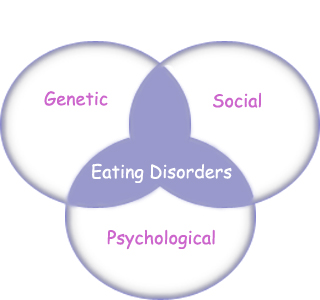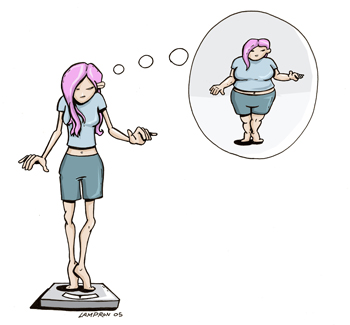Eating Disorder
An eating disorder is a negative change in eating behavior, typically manifested through extreme and unhealthy reduction of food intake or excessive overeating, accompanied by feelings of distress or extreme concerns about body shape or weight.
The 2 main types of eating disorders are anorexia nervosa and bulimia nervosa. Anorexia nervosa is when one engages in self-induced food restrictions and excessive exercise though underweight.Bulimia nervosa is when one overeats uncontrollably, followed by self-induced vomitting and purging using laxatives.
An eating disorder usually develops during adolescence or early adulthood, but some can occur during childhood or later in adulthood.An eating disorder doesn’t stand alone – it tends to bring along other psychiatric problems such as depression, substance abuse and anxiety. Sufferers can experience a wide range of physical health complications as well, such as heart conditions and kidney failure which may lead to death.Females are much more likely than males to develop an eating disorder. For every 10 to 20 females with eating disorders, there would be only one male with similar problem.
An eating disorder is something you have if you compulsively eat in a way that harms your health. Three major types of eating disorder which you are most likely to encounter are:
Anorexia Nervosa This is when you obsessively restrict the amount of food you eat and starve yourself in order to lose weight. Bulimia Nervosa This is when you purge yourself (which means you make yourself vomit or take laxatives to go to the toilet more) in order to prevent gaining weight after over-eating. Binge Eating Disorder This is when you compulsively eat excessive amounts of food. It’s a related part of bulimia nervosa. But unlike bulimia, if you don’t purge yourself after over-eating you would gain weight and could become obese (which is the condition of being unhealthily overweight).If you or someone you know has an eating disorder, then you should know that all eating disorders can be treated and you can recover if you get help. The sooner you get help, then the easier it will be to beat an eating disorder. Living with an eating disorder and not getting treatment can result in risks to your health and complications.
Symptoms
You can detect these signs and symptoms that usually accompany the disorder:
The Physical Signs
1. Significant weight loss in a short period of time
2. Cessation of menstruation of at least 3 months or failure to begin menstruation at an appropriate age
3. Constipation
4. Loss of hair
5. Exhaustion
6. Hypertension
7. Dizziness and fainting spells
8. Dental enamel erosion
9. Excessively dry skin
10. Abdominal distress
The Psychological Signs
1. Depression
2. Confusion
3. Unusual moodiness
4. Forgetfulness
5. Anxiety
6. Outbursts of anger
7. Sleep disorder
8. Spells of crying
9. Repetitive behaviour or thought
10.Bizzare obsessions
The Behaviour
1. Not eating at all or extreme restriction to food intake
2. Cut food into small pieces
3. Excessive dieting
4. Eat only a few number of food groups 5. Hide or hoard food
6. Eat unusually large amount of food
7. Throw up after meal/snack
8. Excessive intake of diet pills, laxatives and enemas
9. Spend long time in the toilet after eating
10. Exercise excessively
Children also are sometimes get affected by eating disorders and the worst part is that, now such disorders are becoming common all over the world! We are going to discuss the phenomenon of eating disorders in children in the proceeding segments.
Types of Eating Disorders in Children
At the outset of this discussion, I’ll acquaint you with some common types of eating disorders in children and then we will move on to the causes, signs and symptoms and treatment.
- Bulimia Nervosa is characterized by overeating high calorie foods or fat foods and then burning those calories either by over exercising and workouts, or by vomiting the entire food. Bulimia nervosa actually happens on account of a feeling of being overweight, out of shape or control. Children on one side are ashamed of being shapeless, but at the same time cannot resist temptations of eating high calorie foods. They think that over exercising or vomiting the food would balance their weight as well as temptation. However, this is completely wrong and proves dangerous for their health.
- Anorexia Nervosa: Females between the age of 14-18 are most widely affected by this type of eating disorder. Anorexia nervosa develops due to an unhealthy feeling of being overweight and shapeless. However, over here the individual tries to starve himself. This leads to an unhealthy weight loss in the person and invites many other health problems.
- Binge Eating: Unrestricted eating without the fear of gaining weight or excessive fat, constitutes the binge eating disorder. This is therefore quite similar to bulimia nervosa! However, the person with this disorder doesn’t care if he is overweight.
Causes of Eating Disorders in Children
Eating disorders are primarily associated with a child’s thinking pattern and attitude. Each child has his own reason of eating less or eating more! Therefore, there are several reasons behind eating disorders in young children. Some of them are listed below.
- Social fears
- Bullying and teasing by others
- Low self esteem
- Fearing adulthood
- Depression
- Stress of fulfilling others expectations
- Bombardment of advertises promoting slim and trim body, importance of perfect shape, etc.
- Anxiety and accumulated anger.
Signs of Eating Disorders in Children
Parents can identify eating disorders in their children, if they show the following signs.
- Over exercising
- Excessive starving
- Restrictive eating behavior
- Being afraid of putting on weight and therefore eating very less
- Inferiority complex of being overweight or underweight
- Insisting on having meals alone
- Isolating from family and friends
- Feeling depressed all the time, due to some past situation
- Wearing over sized clothes to hide fat
Treatment for Eating Disorders in Children
Treating eating disorders in children is actually quite a tough task! However, it needs to be treated promptly, as there are many serious health disorders awaiting at later stages. The following are some treatments for eating disorders in children.
First and foremost thing is that, parents should not force children to eat even when they are full and also allow them to eat, whenever they feel hungry.
- Inculcate the importance of balanced diet, proper height and weight and regular exercises.
- Teach the importance of positive approach to children.
- Let not children starve unnecessarily.
- Stop teasing and criticizing children for their looks and appearance.
- Most importantly, understand children. They are children, they are not grown up adults, who understand everything! Be aware of the fact that, children are undergoing physical and mental changes and therefore might eat more or less.
Causes of Eating Disorders
There are a number of causes of eating disorders including biological, psychological and social factors. Cultural and family pressures as well as personality and emotional disorders also contribute to develop eating disorders. Listed below are some of the common causes of eating disorders:
- Major life transitions: Many people are not able to cope up with some major changes in the life. Some transitions such as entering high school or college, puberty, major illness or death of beloved one can make them feel depressed. As a result, they start excess eating or denying food.
- Emotional and psychological health: Several emotional and psychological problems can contribute to develop eating disorders. Such people may have perfectionism, low self-esteem, anger management difficulties, impulsive behaviors, family conflicts and troubled relationships. .” Psychologists who have graduated from the top psychology schools can help people work through these problems.
- Biological problems: Some people are genetically susceptible to develop eating disorders. People from disordered families are more prone to eating disorders. Serotonin, a naturally occurring chemical in the brain, influences the eating behaviors, as it is involved in the regulation of food intake.
- Sociocultural problems: Most people who develop eating disorders are found to be going through a painful experience of being teased about their obesity. Such people may face an embarrassing situation of relationship breakup. Then they start to believe that it’s all because of their obesity and they start to take hard efforts for the weight loss.
- Traumatic events: People with eating disorders can have a history of physical or sexual abuse. Such people tend to lose weight to lose their secondary sexual characteristics, so that they can avoid further sexual attention. Major injury or illness can also lead to feeling out of control. Bulimia and anorexia can result from attempting to distract themselves from such trauma.
- Other psychiatric illnesses: According to the latest research, some people develop eating disorders in response to other psychiatric symptoms, occurred previously. These symptoms are typically triggered biologically. In such cases, eating disorders can be a reaction to the biological problems.






hello!,I like your writing very a lot! share we keep up a correspondence more about your post on AOL? I need a specialist on this house to resolve my problem. May be that’s you! Looking forward to peer you.
An insightful blog post there mate . Thanks for that .